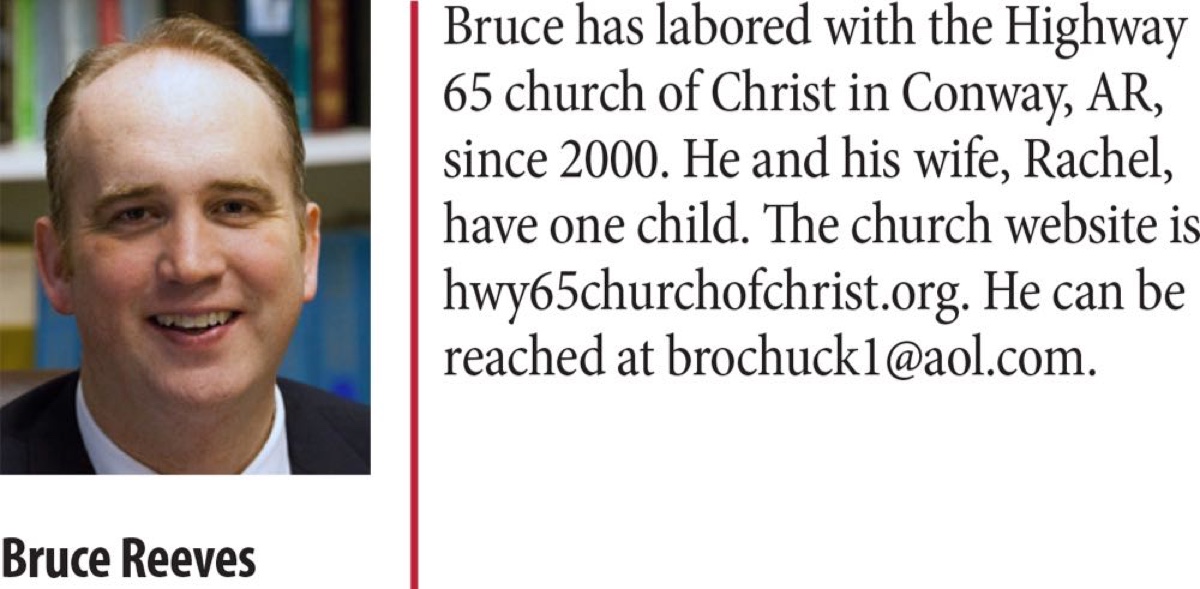By Bruce Reeves
Synopsis: Many are confused about the concept of imputation. Bruce examines this subject from a consistent biblical perspective.
It is without apology or hesitancy that Christians proclaim the true grace of God. Peter wrote, “I have written to you briefly, exhorting and testifying that this is the true grace of God. Stand firm in it” (1 Pet. 5:12). In an epistle that encourages faithfulness to Christ, we are exhorted to stand firm in the defense and knowledge of the Lord’s saving grace (Phil. 1:5-7; 2 Pet. 3:18). Not only does our Savior provide forgiveness, but He also transforms us through the renewing of our minds (Rom. 12:1-2). How are we made righteous? Are we declared righteous because God has forgiven us? Or does Jesus’s perfect life serve as a divine umbrella over us so that God does not see our sins?
We are not saved by earning or meriting our salvation. Such would be impossible for those who have sinned against a holy God. Sin defiles us before His presence and separates us from His fellowship (Isa. 59:1-2). In His love and mercy, our Father offers us hope of eternal life (Eph. 2:4-10; Titus 3:3-7). Yet, the question remains: “How can God receive sinners into His presence?” The gospel declares the Lord to be both “just” and the “justifier” of those who believe in Jesus (John 3:16; Rom. 3:23-26; 5:6-8). Therefore, let us consider the power of Christ’s forgiveness.
Jude warns of “ungodly persons” who “secretly slipped in” among God’s people, having “crept in unnoticed,” to “turn the grace of our God into licentiousness. . .” (Jude 4). Licentiousness refers to behavior that lacks moral restraint and indulges in fleshly lusts. Divine grace leads us to “deny ungodliness and worldly lusts” and to “live soberly, righteously, and godly in the present age” as we anticipate the return of Christ (Titus 2:11-14). The New Testament writers frequently warn their readers of those who would abuse grace to justify rebellion against God (Rom. 6:1, 14). Peter warns of those who attempt to use their freedom in Christ as a “covering for evil” (1 Pet. 2:16). Paul likewise warns of those who misuse the liberty of the Lord for satisfying the flesh (Gal. 5:14) and continue taking part in sin (Rom. 6:1). Even those who have been converted can, through their freewill, depart from the Lord and be enslaved again to the bondage of sin (Gal. 2:21; 5:4; Heb. 3:12-14; 10:26-29; 2 Pet. 2:20-22). Many false theories that disrupt our brethren today are regurgitated denominational errors of the past. These concepts are often repackaged in a way that overtakes those who are naive, uninformed, or dissatisfied with the truth. We especially see this among those intent on reshaping the gospel’s message to conform to society rather than transforming the lost.
Often when we think of Calvinism, we focus on the TULIP theory, which we have addressed in previous articles. Whether we are considering Classic Calvinism or moderate/soft Calvinism, the mechanism that causes this theological system to work in the minds of proponents is what is identified as “the imputation of the perfect life of Jesus to the believer.” Unfortunately, there are some among our brethren that have failed to see the danger of this doctrine. As a result, they either do not teach about it or have embraced it. It is not unusual to see this teaching manifest itself in those who want to expand fellowship on an ecumenical level. Accepting the imputation of the perfect life of Jesus is no small matter.
The triple imputation of Calvinism is as follows:
The transfer of Adam’s sin to all of humanity resulted in total depravity and inability
The transfer of the sins of humanity to Christ’s soul on the cross
The transfer of the personal righteousness of Christ/moral perfection of God to believers
James Orr presents the Calvinistic interpretation when he says: “. . .The term ‘imputation’ has been used in theology in a threefold sense to denote the judicial acts of God by which the guilt of Adam’s sin is imputed to his posterity; by which the sins of Christ’s people are imputed to Him; and by which the righteousness of Christ is imputed to His people” (“Imputation,” Editor, ISBE, Vol. II, 1462-1463).
It is always essential for diligent Bible students to define terms because error redefines biblical terms unbiblically. For example, the word “impute” does not mean “transfer” or “replace.” The Greek word that is translated as “impute” occurs thirty-nine times in the New Testament, and eleven of those are found in Romans 4. The word is an accounting term, meaning “to reckon,” “put to one’s account,” or “credit,” but it does not communicate the concept of transfer.
Despite his Presbyterian background, Albert Barnes correctly commented on the scriptural use of the term “impute”:
I have examined all the passages, and as the result of my examination have come to the conclusion, that there is not one in which the word is used in the sense of reckoning or imputing to a man that which does not strictly belong to him; or of charging on him that which ought not to be charged on him as a matter of personal right. The word is never used to denote imputing in the sense of transferring, or of charging that on one, which does not properly belong to him. The same is the case in the New Testament. The word occurs about forty times and in a similar signification. No doctrine of transferring, or of setting over to a man what does not properly belong to him; be it sin or holiness, can be derived, therefore, from this word. Whatever is meant by it here, it evidently is declared that the act of believing is that which is intended, both by Moses and Paul (Barnes, Romans, 96).
Nevertheless, Calvinists argue the very opposite. The Philadelphia Confession of Faith states: “Those whom God effectually calleth, He also freely justifieth. . . not by imputing faith itself, the act of believing, or any other evangelical obedience to them, as their righteousness; but by imputing Christ’s active obedience unto the whole law, and passive obedience in His death for their whole and sole righteousness by faith, which faith they have not of themselves; it is the gift of God.”
Calvinist David Landon wrote, “The apostle Paul gives both sides of this exchange in one verse. . . That being ‘made the righteousness of God’ is by the imputation of Christ’s righteousness to us follows from the parallel that Paul draws from Christ being made a sinner. . . Our sins are imputed to Him. In like manner His righteousness is imputed to us” (Landon-Sharp Debate).
S.H. Hall said, “Though we fall short, if we will come into and are faithful till death, all we lack in attaining sinlessness He will supply from His own perfect life. . . Those who do this are complete in Him, because all that they lack is supplied from His perfect life, and because of this can be presented in Christ in the judgment” (Sower, May/June 1986).
When brethren become enamored with the teachings of writers such as John MacArthur, John Piper, and Tim Keller, or even the past writings of men such as Ed Fudge, Bruce Edwards, or Arnold Hardin, they often adopt the language, phrases, and slogans that are rooted in unbiblical models and systems regarding God’s grace and fellowship.
At first, some do not grasp the concepts lying behind the terms and phrases, but it is only a matter of time before they do so. The catalyst for their departure is that they persist in drinking deeply from the wells of false teachers without discernment, which promotes dissatisfaction with the truth of the gospel. When we hear teaching that indicates that either God’s personal perfection or Jesus’s perfect life “replaces” or is “laid upon” our unrighteousness, or that the Lord sees Christ’s perfect life instead of our sins, as though we were living under a divine umbrella, we must beware! Some may seek to rationalize such expressions to mere semantics, but this teaching is conceptually false and central to Calvinistic perspectives.
The gospel declares that we are made righteous through divine forgiveness, which occurs by grace through faith, thanks to the death of Christ, the cleansing of His blood, and His resurrection from the dead (Matt. 26:28; Rom. 5:9; 1 Cor. 15:3-4; Eph. 1:3, 7; Heb. 9:26; 1 John 1:7-2:2). One concern regarding the Calvinistic imputation theory is the question of whether one is ever actually made righteous or if God looks the other way. The writer of Hebrews declares the sufficiency of the atoning sacrifice of Christ to sanctify us: “By this will we have been sanctified through the offering of the body of Jesus Christ once for all. . . For by one offering He has perfected for all time those who are sanctified” (Heb. 10:10, 14). The conditions of the gospel do not deny the sufficiency of the death and resurrection of Christ to save us, but rather confess the power of His grace (Acts 2:38; 22:16; Rom. 6:3-4; Gal. 3:26-27; Col. 2:11-13; 1 Pet. 3:21). Peter wrote, “He Himself bore our sins in His own body on the cross, so that we might die to sin and live in righteousness; for by His wounds you were healed” (1 Pet. 2:24).
In defense of Reformed Theology, Charles Hodge states, “So when righteousness is imputed to the believer, he does not thereby become subjectively righteous” (3:145). The doctrine of the transfer of guilt or righteousness portrays justification as an elaborate shell game and has been described by critics as “legal fiction.” In stark contrast, biblical justification by the blood of Christ makes the sinner right with God because his sins have been purified (1 Pet. 1:18-23; 2 Pet. 1:18-10). Well-known Calvinistic apologist James R. White comments in his book, The God Who Justifies: “It produces no change in the individual to whom the imputation is made; it simply alters his relation to the law” (White, 114). Calvinists argue that regeneration partially changes one’s depraved nature before one has faith and that the unconditionally elected are irresistibly given the irrevocable gift of faith. Yet, they argue that even the saved continue to be sinfully depraved. So, which is it? Are we still depraved, wretched, spiritually enslaved, and dead as in Romans 7 or have we been freed from the bondage of sin in the transforming grace of God as in Romans 6 and 8? Reformed teachers technically define justification as strictly legal or forensic because of their view of triple imputation. Neo-Calvinists among our brethren have wrongly asserted the imputation of the personal righteousness of Christ to present erroneous views of grace and unity to defend the acceptance of those who are teaching and practicing error (2 John 9-11).
Matthew 6:33 says, “But seek first His kingdom and His righteousness, and all these things will be added to you.” To argue that this verse speaks of the transfer or replacement of Christ’s personal righteousness to the believer reflects a neo-Calvinistic perspective that violates both the immediate and remote context of Scripture. The righteousness of God in Matthew 6:33 reiterates Jesus’s message of practical discipleship in the Sermon on the Mount (Matt. 5: 6, 10, 12, 20). “His righteousness” refers to living in harmony with God’s purpose and teaching.
In Romans 4:1-8, Paul presents the means of our justification as being the Lord’s forgiveness, the sacrifice of Christ, and the surrender of faith in Jesus. The terms “account” or “impute” are translated as “credited” in the NASB. One’s faith is credited as rightness before God, not another person’s faith. This occurs when God forgives a person of his sins and he obeys the gospel (Rom. 1:5, 16-17; 6:16-17; 16:26; cf. Eph. 2:8). Therefore, the apostle references Psalm 32:1-5 as he emphasizes forgiveness. Righteousness is put to our account because our “lawless deeds have been forgiven.” God mercifully forgives our sins by means of Jesus’s sacrifice through the condition of the obedience of faith. The Lord’s righteousness speaks of how He makes us right with Himself in the gospel (Rom. 10:3).
Romans 5:10 says, “For if while we were enemies we were reconciled to God through the death of His Son, much more having been reconciled, we shall be saved by His life.” Paul’s point is that both the death and resurrection of Jesus save us (1 Cor. 15:3-4). The “life” in this passage speaks of the “resurrection life” of our Lord (4:24-25; 5:6-8; 8:34; 1 Cor. 15:20-22; Heb. 7:25). Those who appeal to this verse to defend the Calvinistic view of imputation do so despite the context and because of their preconceived notions.
Romans 5:19 says, “For as through one man’s disobedience the many were made sinners, even so through the obedience of the One the many will be made righteous.” Paul neither says that Adam’s sin was imputed to us, nor that Christ’s perfect obedient life is imputed to us. Rather, he says that sin entered the world through Adam’s one trespass (Rom. 5:12-18). He also teaches that it is through Christ’s obedient act of dying for humanity on the cross that the free-gift of salvation is offered (Rom. 5:19-21; cf. 3:23-26; Phil. 2:6-8; Heb. 5:8-9). Calvinists face a serious problem here. If the argument is made that this affirms an automatic imputation of humanity’s sin to all of Adam’s posterity, how can they escape the logical conclusion of the universal imputation of righteousness to all mankind, resulting in universal salvation?
In Philippians 3:8-10, Paul expresses his desire to “gain Christ, and. . . be found in Him, not having a righteousness which is derived of the Law, but that which is through faith in Christ, the righteousness which comes from God on the basis of faith, that I may know Him. . . .” Advocates of this teaching assume that the phrase “righteousness of God” refers to the transfer of the perfect life of Jesus or moral perfection of God to the believer. However, “the righteousness of God” refers to the condition of being right with God by His forgiveness through faith (Gal. 3:10-14).
The logical consequence of this teaching, despite the protestation of its defenders, is a denial of the sufficiency of Christ’s sacrifice for our justification and sanctification (Heb. 10:10, 14). The doctrine also allows the believer to continue in sin without God crediting that sin to his account, thus denying personal responsibility (1 Cor. 6:9-11; cf. Ezek. 18:4, 20-32). This view of Calvinism undermines the transformation of God’s grace (Rom. 6:3-4; 12:1-2; 2 Cor. 3:18; 2 Pet. 1:4). God’s grace does not leave us in the enslavement and bondage of sin, but transforms, redeems, and restores us into the image of Christ (Eph. 4:22-24). Therefore, let us praise God for His forgiveness, sacrifice, and renewal.
Barnes, Albert. Barnes’ Notes on the New Testament: Romans. London: Blackie & Son, 1834 Online.
The International Standard Bible Encyclopedia (ISBE). James Orr, General Editor. Chicago, IL: Howard-Severance Company, 1915.
White, James R. The God Who Justifies. Bloomington, MN: Bethany House Publishers, 2007.




